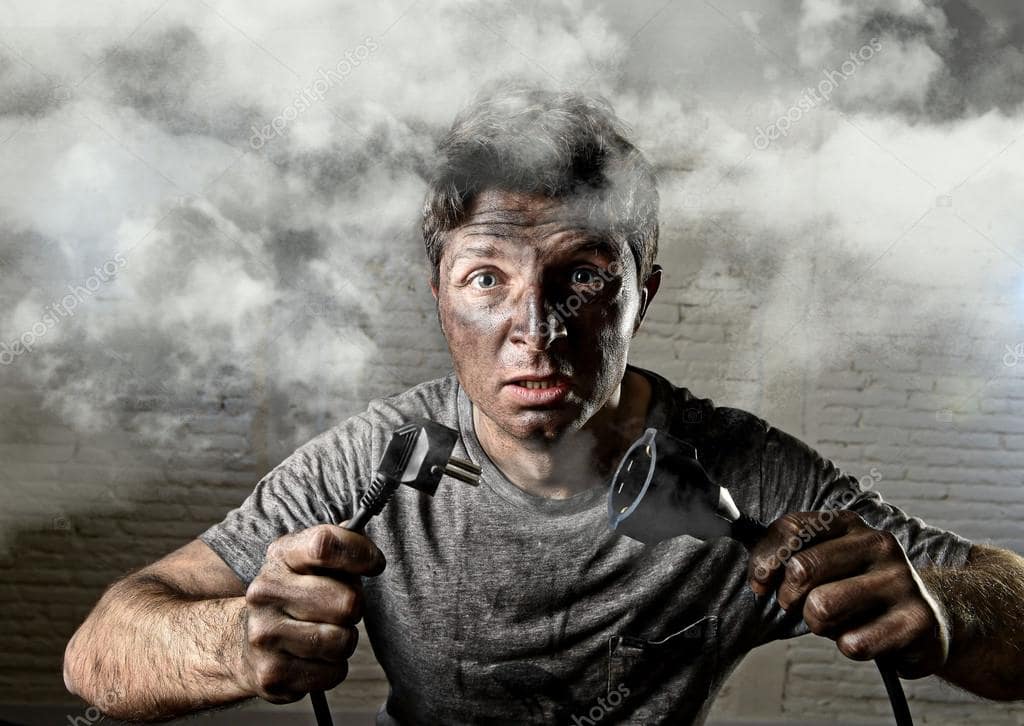Every time you flip the switch, you must consider the safety precautions involved with doing the electrical repair at home. To ensure you’re on the right track and your safety is not compromised, follow these suggestions for safe electrical repair.
Respect the Power
Don’t underestimate the power of electricity. It can be lethal and can cause severe damage to your home. Unplug the unit or turn off the circuit switch before you begin. When using test equipment, put one hand in a pocket and hold any metal object with the other hand to avoid being shocked by an unexpected power surge.
Take It Apart First
To not burn yourself or break anything else when working on an electrical appliance, it’s best to cut the power off first and then take apart whatever needs repair–whether it’s a lamp, fan, or significant device. If you don’t know what all of it is, then take it in for repair. If you are uncomfortable doing that, keep your hands clear of the electrical source until everything is safe.
Use An Extension Cord
When working on anything electrical, it’s best to use an extension cord. It doesn’t matter what type–it could be a heavy-duty cord or one with a light bulb. When using an extension cord, ensure that you do not overheat the line and avoid placing any electrical components on top. Furthermore, ensure your extension cord is fully plugged into the receptacle and the circuit before using it for any repair work.
- Differences Between Fixed Wiring Testing and PAT Testing
- Sustainability in Flex: Green Practices in Flexible PCB Manufacturing
Use The Right Connection
One of the biggest mistakes you can make when working on electrical repair is using the wrong size or the wrong kind of wire and connectors. This could cause a fire in your house and possibly even the death of you and your family.
Use The Right Materials
Only materials used initially and tested for safe work are needed for electrical repairs. It’s a good idea to carry out your experiments in your garage so that you won’t cause any damage to your home or anything else when it accidentally happens inside. This includes screw-on connectors and all types of wire. If you need help with what to use, it’s best to call your local utility company for advice.
Know Where To Go
If this is your first time doing electrical repairs, finding a location where you can get hands-on experience is a good idea. Many schools offer courses and certifications on electrical repair and safety. For more information about electrical repair at home, contact your local utility company or a licensed electrician for help.
Wear All The Right Equipment
When repairing an electrical appliance, wearing the right equipment can make a difference in your safety. Don’t forget to wear rubber gloves, eye protection, a face shield, and comfortable work boots that won’t get damaged by metal objects. Also, remember to wear long pants and a long-sleeved shirt–protection for your hands and body just in case you accidentally get too close to a live wire.

What to Know Before Doing an Electrical Repair at Your Home.
Know the Circuit
Never do any electrical repair in any wet part of your home. If you have pets, ensure they’re not around because they might get close to a live wire. If anyone’s inside, make sure they get out first before doing repair work.
Never Use an Extension Cord in the Wiring Closet
Never use an extension cord in the wiring closet–this is where all wires run into the house and connect to power sources. It is a good idea to cover them with simple plastic when working on any electrical repair in that area.
Never Cut Any Wires
Never cut any wires inside the house–this could cause a fire or cause damage to the wiring in your home and could lead to a bigger problem later. It’s also not okay to cut wires outside the house under any circumstances–not for safety, but for legal reasons. Not to mention you could do some severe damage to your body as well as your home.
What to Do if You Don’t Know How to Fix the Electrical Issue.
Contact professionals or a licensed electrician
Even if you can take care of the problem independently, it’s best to contact professionals or a licensed electrician for help. You could be running into lethal wiring or other hazards that can cause electrical fires in your house. Remember, it’s always better to call the pros than to risk your safety and the safety of others in your home.
What Not to Do When Working on an Electrical Repair
Don’t touch live wires
It would help if you never touched any live wires outside your home for any reason other than repair work. Remember, electrical appliances can give off a dangerous shock if touched by anyone unfamiliar with them. If you have children in the house, even worse–make sure they know not to connect any live wires.
- Top 5 Essential Electrical Wiring Rules to Follow for Your Home
- Breaker Size Calculator: AC and DC Circuit Breaker Sizing Calculator
Don’t use a damaged wire
No matter the reason, you should never use a damaged wire near other wires or electrical appliances. You will find that often a wire is heavy-duty but damaged in one spot–in these cases, you should always replace the entire cord and not just the damaged part.
Respecting electricity’s power and using it according to safety standards is essential. Learning about the basic rules of working on electrical appliances is also necessary.
amazing blog post, my favorite bookmarks. thanks !